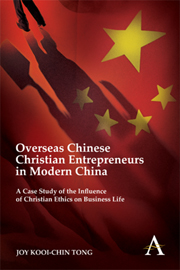 Overseas Chinese Christian Entrepreneurs in Modern China
Overseas Chinese Christian Entrepreneurs in Modern China Book contents
- Frontmatter
- Contents
- Acknowledgments
- List of Tables and Figures
- Chapter 1 Introduction: Studying Christian Ethics and Business Life in Post-1978 China
- Chapter 2 Religion and Economic Life: The Protestant Ethic and Max Weber's Legacy
- Chapter 3 Overseas Chinese Christian Entrepreneurs in Post-1978 China (Shanghai): Business, Faith and Ethics
- Chapter 4 Religious Motivation and Entrepreneurial Spirit
- Chapter 5 Business–Faith Integration: Three Types of Christian-Based Companies
- Chapter 6 Communities of Faith: Fellowships for Overseas Chinese Christian Businesspeople in Shanghai
- Chapter 7 Female Entrepreneurs: Four Stories
- Chapter 8 Conclusion and Research Implications
- Bibliography
- Index
Chapter 5 - Business–Faith Integration: Three Types of Christian-Based Companies
Published online by Cambridge University Press: 05 May 2012
- Frontmatter
- Contents
- Acknowledgments
- List of Tables and Figures
- Chapter 1 Introduction: Studying Christian Ethics and Business Life in Post-1978 China
- Chapter 2 Religion and Economic Life: The Protestant Ethic and Max Weber's Legacy
- Chapter 3 Overseas Chinese Christian Entrepreneurs in Post-1978 China (Shanghai): Business, Faith and Ethics
- Chapter 4 Religious Motivation and Entrepreneurial Spirit
- Chapter 5 Business–Faith Integration: Three Types of Christian-Based Companies
- Chapter 6 Communities of Faith: Fellowships for Overseas Chinese Christian Businesspeople in Shanghai
- Chapter 7 Female Entrepreneurs: Four Stories
- Chapter 8 Conclusion and Research Implications
- Bibliography
- Index
Summary
For businessman, it is not a choice between mammon and God, but a challenge to make the one serve the Other.
—Thomas C. Campbell, Jr. (1957)There are a growing number of self-described “Christian” companies in China today which are owned by both overseas and local Chinese Christians. These companies have declared their conviction to operate with an explicitly evangelical Christian corporate ethos, a phenomenon which is surprising given that China is ruled by an atheist government with a long history of hostility toward Christianity. To a certain extent, these Christian bosses' efforts, in particular those of the Overseas Chinese, can be seen as influenced by a new and worldwide mission movement which emphasizes that business in and of itself is a ministry and instrument of God. The core idea is about motivating “the entrepreneurs and business professionals within the church to transform the world through their business activities” (“Business as Mission” 2004).
Intriguingly, if we refer to The Protestant Ethic, Weber focuses on individuals and not on business firms. His book has more to do with the spirit or mentality of the atomic economic actors than with the concrete organization of society. Certainly, Weber's methodological individualism, the idea that sociology begins its analysis with the individual along with the meaning that the individual attaches to his or her behavior, has contributed significantly to his approach in The Protestant Ethic.
- Type
- Chapter
- Information
- Overseas Chinese Christian Entrepreneurs in Modern ChinaA Case Study of the Influence of Christian Ethics on Business Life, pp. 91 - 106Publisher: Anthem PressPrint publication year: 2012


